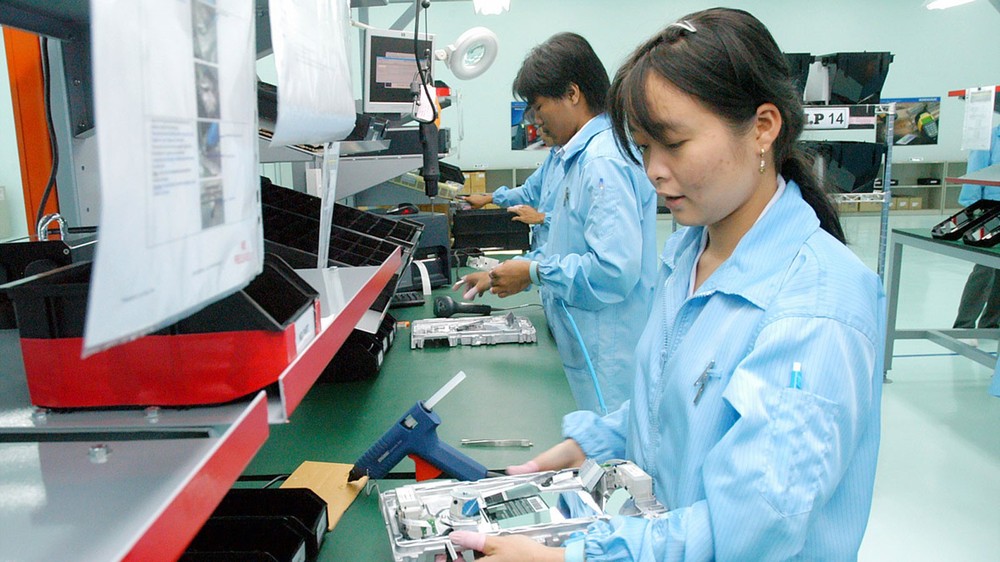 |
Workers of Datalogic Co. are manufacturing electronic products in Saigon Hi-tech Park in HCMC. (Photo: SGGP) |
Takahisa Onose, representative of VBF’s tax and customs task force, informed that members of the Cooperation Forum under the Organization for Economic Cooperation and Development (OCED) reached a consensus on the Action Plan on Base Erosion and Profit Shifting (BEPS).
One important part of BEPS is a solution for a global minimum tax of 15 percent in order to ensure the profits of multi-national corporations in the event that those profits are enjoying lower tax rates or even tax exemption. Vietnam has valid reasons to join BEPS.
What is left now is suitable measures to cope with disadvantages of this policy when it comes into effect in 2024. At that time, Vietnam’s preferential policy on corporate income tax will be meaningless to certain investors, many of whom are major businesses with a revenue of €750 million and above.
In other words, Vietnam will have to compete with not only neighboring countries like China, India, Indonesia but also the homeland of investors for high-quality Foreign Direct Investment (FDI). The governments of developed nations tend to limit investment in other countries to cope with their own economic depression, unemployment status while ensuring their national security for basic technologies.
The latest report by Vietnam's Association of Foreign Invested Enteprises (VAFIE) reveals that the US, France, Japan, the Republic of Korea are implementing various policies, ranging from corporate income tax reduction to support for the shift of manufacturing facilities back to their own countries. Meanwhile, the United Nations Conference on Trade and Development this year forecasted that the global investment flow will continue to decrease. Most of it will come to any nations continuously try to attract investment.
Therefore, participants in VBF proposed two measures of promoting the legalization of global minimum tax in Vietnam and introducing supporting policies to businesses and foreign investors affected by that tax.
In response, the Finance Ministry said that the Government is going to review and amend 10 tax laws until 2027. Particularly, in 2023 and 2024, this Ministry plans to develop a law to amend and supplement the Law on Value Added Tax, the Law on Special Consumption Tax, and the Law on Corporate Income Tax.
Thomas McClelland, Deputy General Director in charge of tax consultation of Deloitte Vietnam, voiced that at present, the country can consider the solution to apply the same residual profit and minimum tax as those stipulated in BEPS according to OECD guidelines. This is also the intention of neighboring countries and territories like Hong Kong, Singapore, Malaysia.
Another of his proposal is a financial aid as a partial support to investors in manufacturing facilities, machines, human resources, research and development, intellectual property. This solution has been quite effective in many countries in Europe and Asia to promote the growth of priority fields. However, being a developing nation, Vietnam should carefully evaluate potential impacts of the solution before implementing it.
Chairman Nguyen Mai of VAFIE shared that the advantages of Vietnam as an attractive investment location have been reduced. All businesses surveyed by VAFIE in 2022 expressed their wish for the Vietnamese Government to review and comprehensively adjust foreign investment policies to better adapt to fluctuations in the global economy as well as FDI strategies of other nations.
Delphine Rousselet, CEO of the European Chamber of Commerce in Vietnam, stressed that improvement in administrative procedures can help Vietnam to attract more international investors. John Rockhold, Chairman of American Chamber of Commerce in Vietnam, commented that it is necessary to address the issue of loan interest rate for investments in green growth because the two-digit rate now is disadvantageous to investors. Improvements of infrastructure, public services an elimination of corruption, quick responses to valid inquiries from businesses are a must as well.
Deputy Minister of Planning and Investment Nguyen Thi Bich Ngoc asked for more suggestions from businesses, investors, legal experts to ensure the three goals of being harmonious between the interests of the State and those of investors, suitable for international commitments and OCED regulations, suitable for the real situation of Vietnam.
Vice Chairman Nguyen Dang Hien of HCMC Food and Foodstuff Association concerned about the significant influences, especially negative ones, of policies on small and medium-sized enterprises. It is unwise to introduce a policy that is against international practices. Also, the Government should address inadequacies in policies affecting businesses, besides supports on capital, tax, fees for enterprises to be able to overcome obstacles and increase their competitiveness against FDI companies.
Vice Chairman Truong Chi Binh of the Vietnam Association of Supporting Industries commented that the ability to join the global supply chain is a tough challenge to domestic businesses because most of them are small and medium-sized. At present, the Association is implementing measures to help its members like linking orders to reduce shipping cost, and in turn retail prices, thus increasing the competitiveness; forming a manufacturing chain for multi-part products for businesses to improve their role in the global supply chain.
Investment incentive policies for supporting industries are surplus and quite comprehensive, yet their application is rather inadequate. There are still discrimination and unfairness towards domestic companies as opposed to FDI counterparts. This requires review and correction by the local authorities and relevant functional agencies to ensure the rights of all businesses, FDI or not.
























